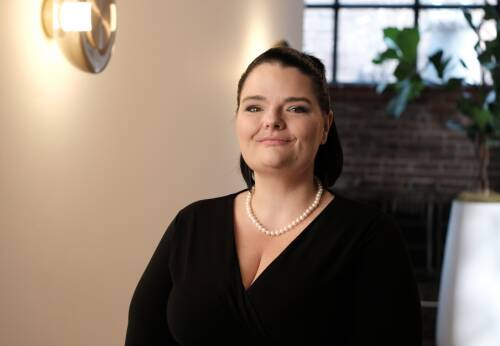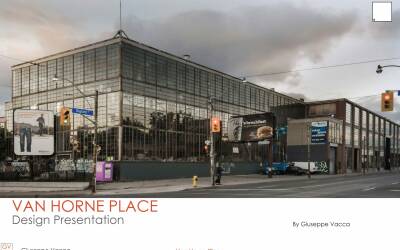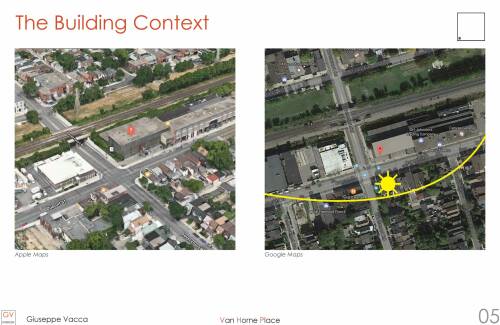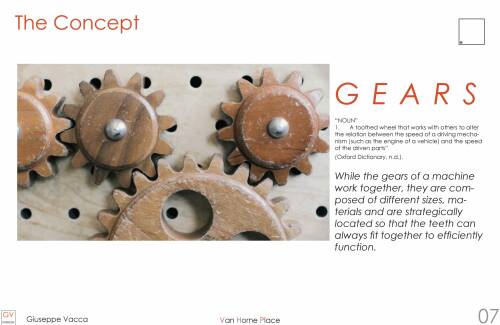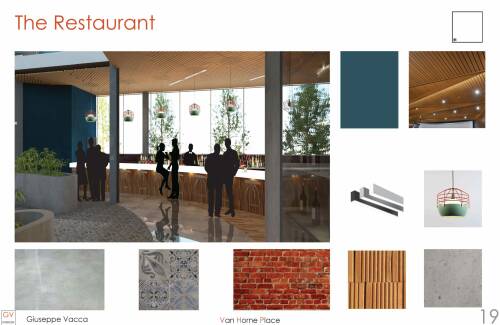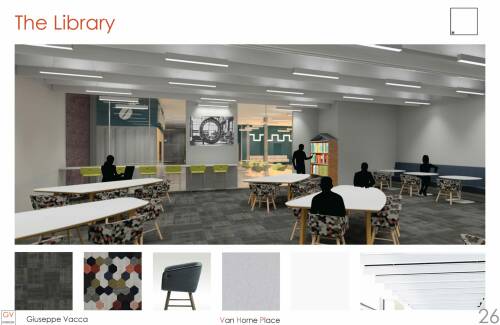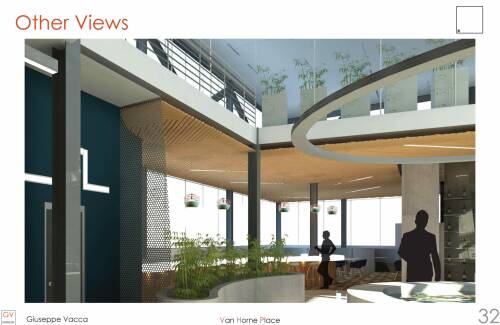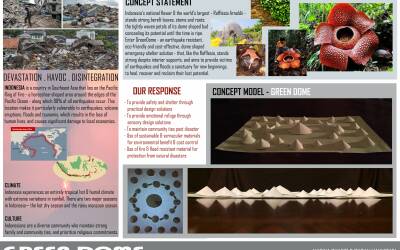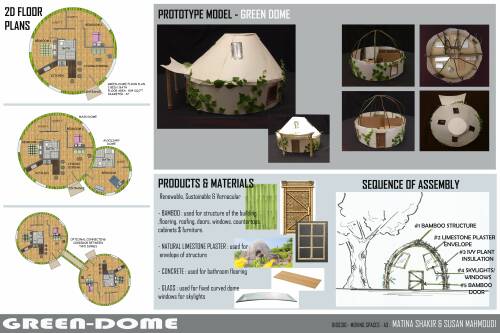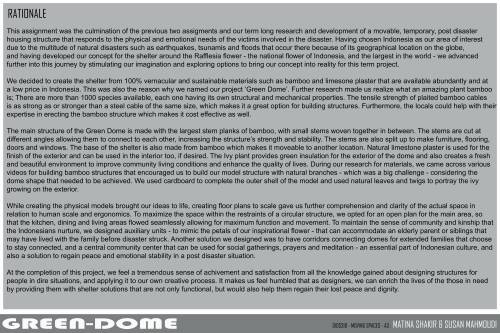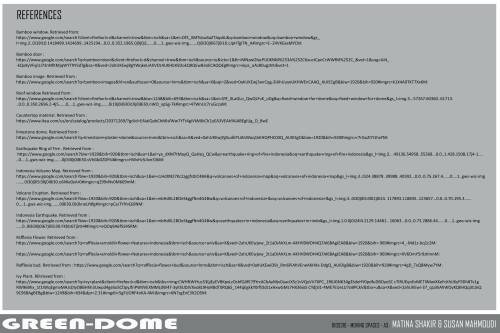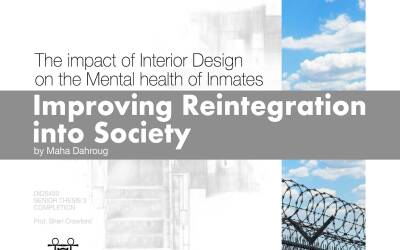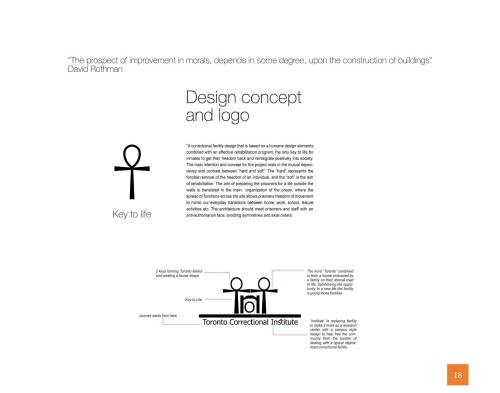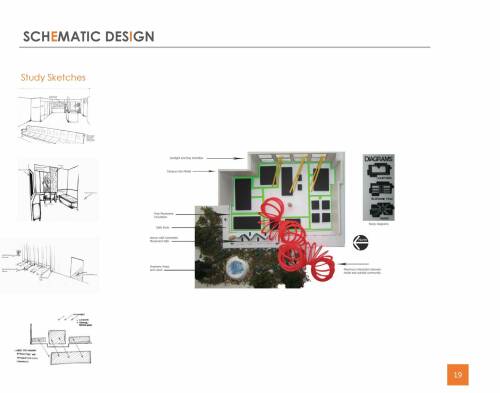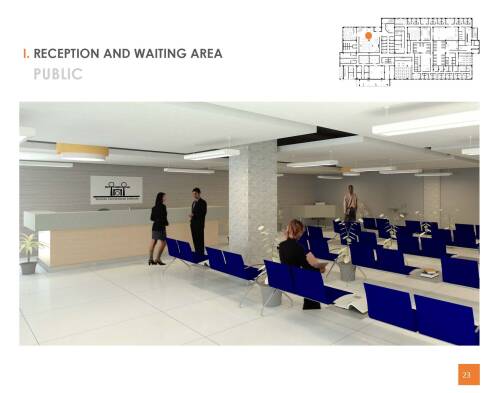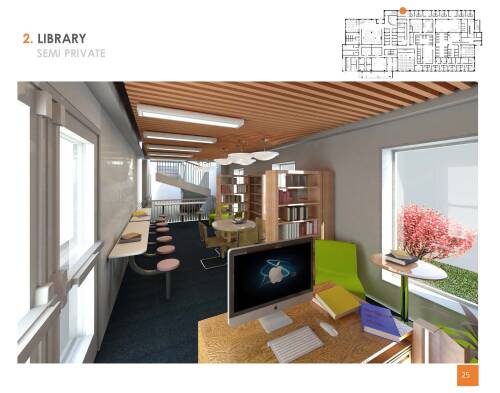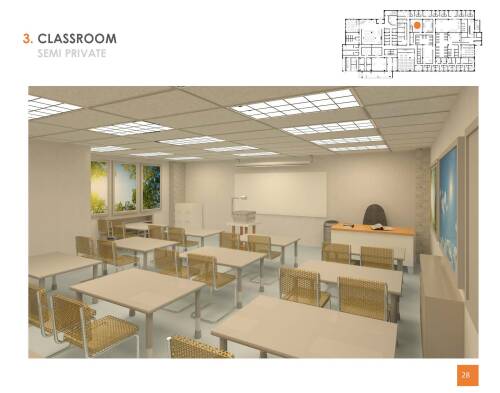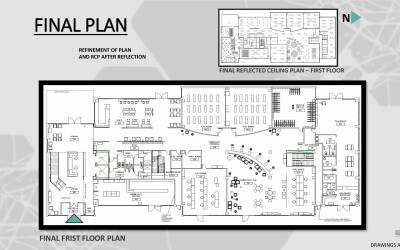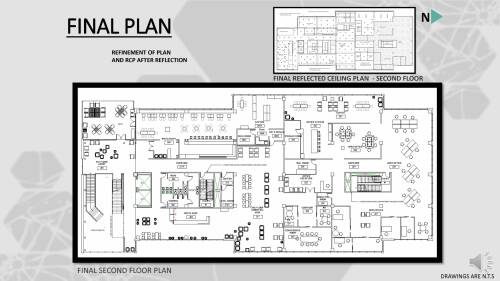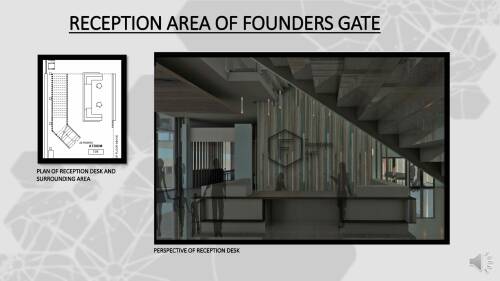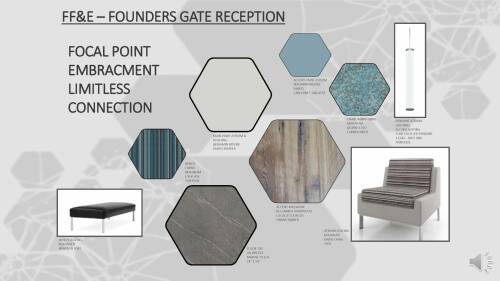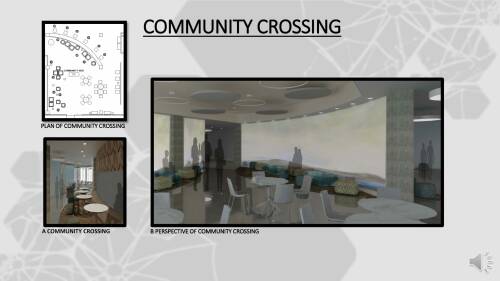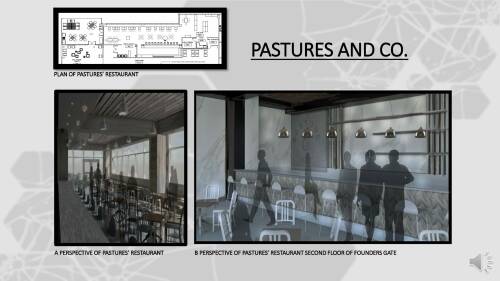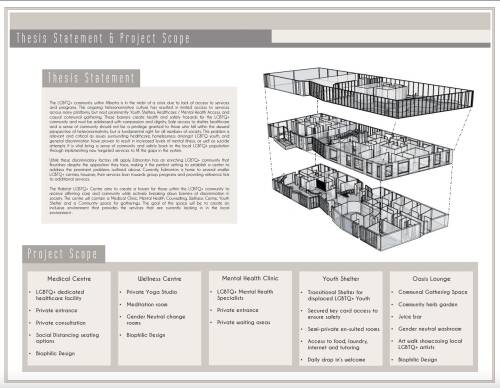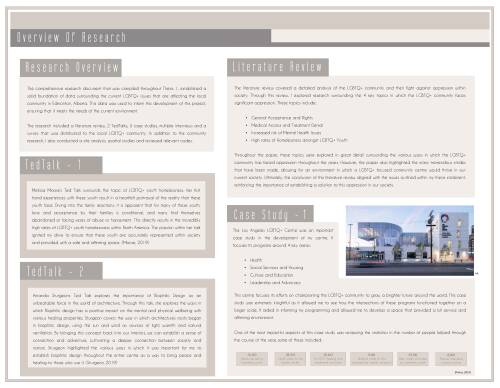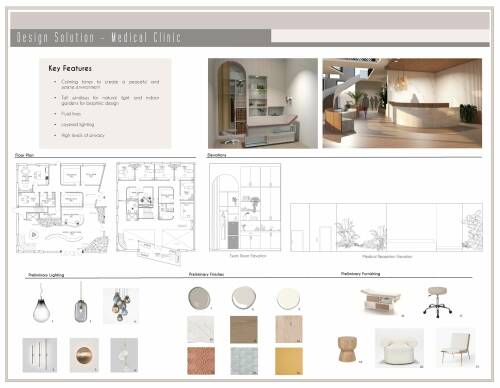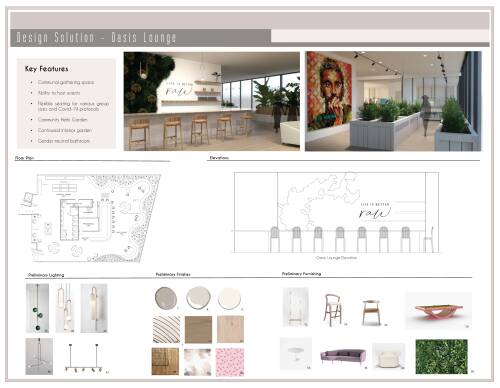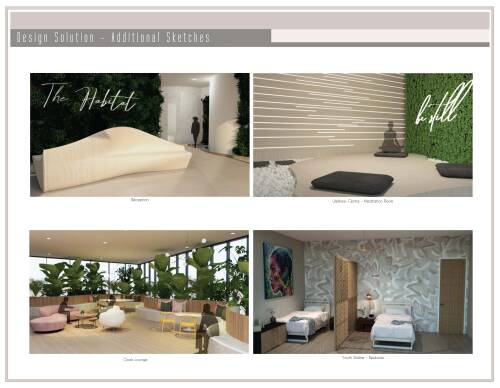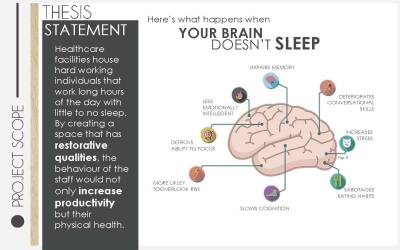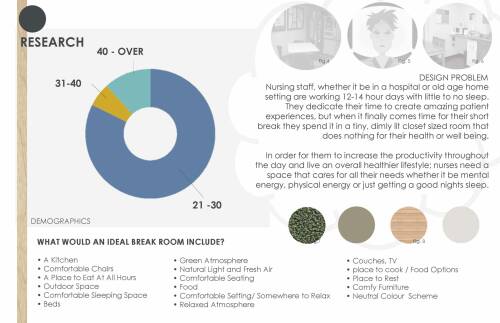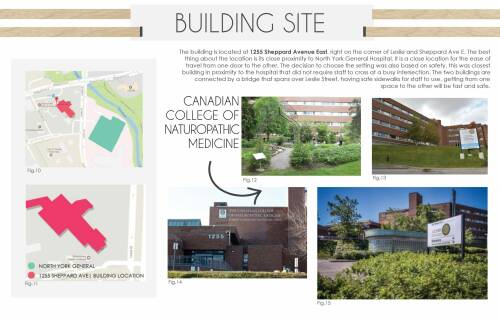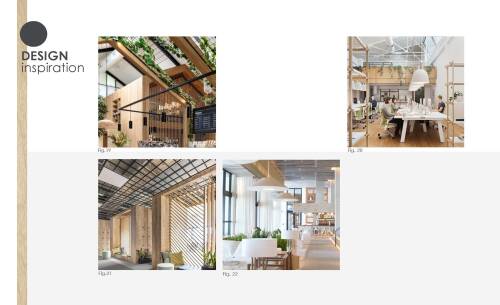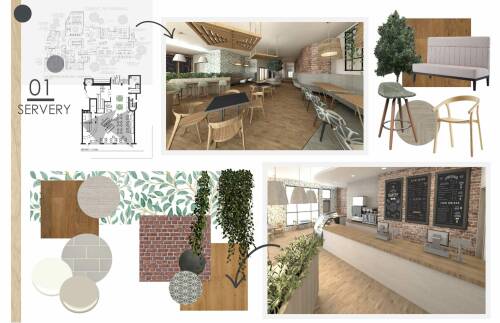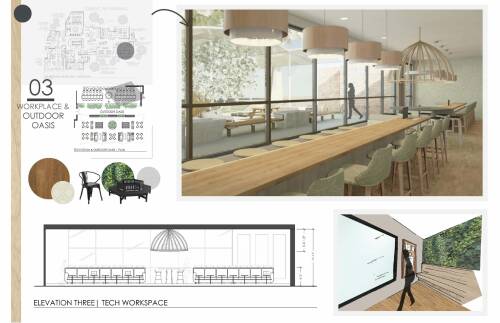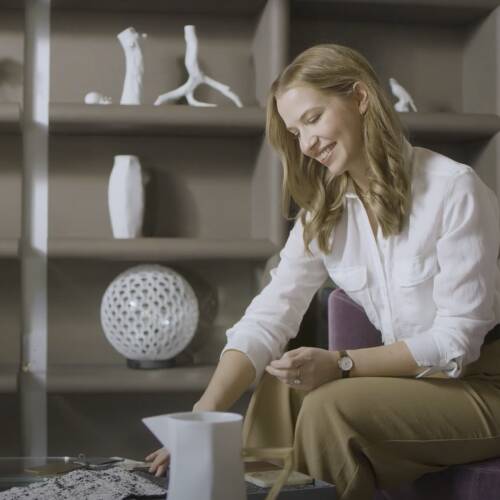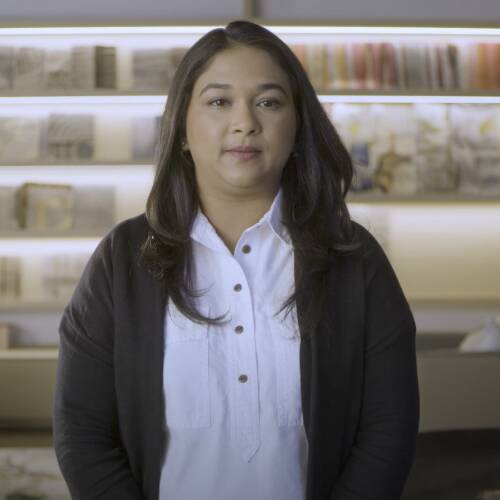Canada’s Only CIDA-Accredited Online Bachelor of Interior Design
The Bachelor of Interior Design program at Yorkville University is the only CIDA-accredited online degree in Canada without a residency requirement.
Fully Online, Flexible Program – Your busy schedule shouldn’t hinder you from the career you’ve always wanted. This industry-based program is designed for individuals passionate about creating sustainable design solutions for the health, welfare and safety of the individuals.
Comprehensive Curriculum – Our program spans everything from design theory, drafting, digital rendering, space planning to building systems, codes, and regulations and includes an NCIDQ exam prep course.
Showcase Thesis Project – We emphasize the importance of social and environmental factors in design, culminating in a thesis project that showcases your proficiency in crafting beautiful, practical, and environmentally conscious spaces.

1
st
Canada's only fully online CIDA-Accredited BID Program

73
%
Post-graduation employment rate*
$2.1B
Revenue from the interior design industry**
New Term Starts Soon
Starts:
January, April, July, October
Campus:
100% Online
Duration:
As few as 2.5 years***
*Based on 2024 survey
**Published by IBIS World as of Dec 2023
***With full course load, year-round study and/or approved transfer credits. Contact an Admissions Advisor for more information.
Program Benefits
Accreditation & Recognitions
Launch your career with an interior design degree that is well respected by the industry and accredited by the Council for Interior Design Accreditation (CIDA).
The rigorous program is recognized by the Association of Registered Interior Designers of Ontario (ARIDO) and Interior Designers of Canada (IDC). In fact, our students have participated and won multiple competitions such as Norma Ruth Ridley prestigious award with ARIDO, honorary mention with NKBA (National Kitchen and Bath Associations), Formica competition, and IDEC among others.
Graduates also meet the necessary educational requirements to take the NCIDQ exam, which is a critical step towards professional registrations and earning the title of interior designers, as in Ontario, and other jurisdictions in North America.
The interior design program leading to the Bachelor of Interior Design degree is accredited by the Council for Interior Design Accreditation, www.accredit-id.org, 206 Grandville Avenue, Suite 350, Grand Rapids, MI, 49503.
The CIDA-accredited program prepares students for entry-level interior design practice, for advanced study, and to apply for membership in professional interior design organizations. The Bachelor of Interior Design degree granted by Yorkville University meets the educational requirement for eligibility to sit for the National Council for Interior Design Qualification Examination (NCIDQ Exam). For more information about NCIDQ Exam eligibility visit: https://www.cidq.org/eligibility-requirements.
Career Outcomes
Bachelor of Interior Design graduates create functional, inspirational and healthy environments for living, working and playing. Graduates are qualified to write the NCIDQ exam to professionally register as an interior designer, which is required to practice in some jurisdictions in Canada and the U.S.
A variety of rewarding careers include:
-
Hospitality Design (hotels and restaurants)
-
Healthcare Design
-
Corporate Design
-
Educational Design
-
Residential Design
-
Furniture Manufacturing and Supply
-
Lighting Design
-
Exhibit Design
-
Facilities Management
Where Some of Our Graduates Work












Student Showcase
Immerse yourself in the dynamic realm of our Bachelor of Interior Design program as you peruse our Student Showcase. Discover compelling projects curated by our talented students, revealing their innovation, skill, and distinctive perspectives in the world of interior design.
Faculty
Meet the Program Chair

Reem Habib
MA. Interior Architecture, NCIDQ, LEED®Green Associate™, WELL AP
Reem holds a bachelor’s and a master’s degree in interior architecture and decorative Arts. She graduated in June 2007 from the Lebanese University of Fine Arts.
While pursuing her studies in Interior Architecture, she majored in English literature as well and earned a bachelor’s degree in English Literature and Humanities, from the Lebanese University of Literature and Humanities, in December 2007. She is currently pursuing her PhD. in Environmental Design at the University of Montreal. Reem has been practicing interior design in Dubai, Lebanon, and Canada since 2007. Her professional experience covered the fields of hospitality, residential, and commercial design. While in practice, she joined academia and taught at the American University in Dubai from 2009 to May 2019.
She is a LEED Green Associate, WELL AP, AutoCAD 2018, and Revit Architecture 2018 Certified Professional.
In 2019 Reem moved to Canada with her family and joined the Bachelor of Interior Design program at Yorkville as a full-time faculty in January 2020. Since July 2022, she started her journey the Program Chair of BID program.
During the past two years, Reem participated in IDEC conferences and was a co-author of a book chapter in “Teaching in the Post COVID-19 Era: World Education Dilemmas, Teaching Innovations and Solutions in the Age of Crisis” – Springer: Switzerland-2021.
In addition, she has a passion for arts and has participated in various art and design competitions and group exhibitions, mainly in the United Arab Emirates. Oil painting, watercolor, and ink are her favorite media. She loves making ceramics and pottery as well.
Reem lives in Markham, Ontario, with her husband and two children. She enjoys outdoor adventures, visiting museums and exhibitions, and trying new restaurants. During her free time, she enjoys reading, painting, and baking!
Meet the Faculty
Admission Requirements
Yorkville University welcomes applicants of all backgrounds to apply to the Bachelor of Interior Design online program, which is administered by our Concord (Steeles) Campus. Please note that admission requirements and tuition and fees are the same for domestic and international students.
Concord (Steeles) Campus, Ontario
High School
Students entering the Bachelor of Interior Design degree program from high school are required to have an Ontario Secondary School Diploma (OSSD) or equivalent with at least a 65% average in six courses including:
- English, Grade 12
- One Math, Grade 11 or Grade 12 at the U/M level or equivalent
- Four or five other Grade 12 subjects at the U/M level or equivalent; with a minimum of six Grade 12 courses
Students entering from high school are also required to provide:
- Official high school transcript*
- Resume
- Statement of Interest
- Completed online application
- Application fee of $150
*All official transcripts need to be sealed and stamped, and sent directly from the issuing institution to our Admissions Services Department for evaluation.
Have any questions? Please contact an Admissions Advisor.
College and University
Students entering from another university or college will be assessed on a case-by-case basis.
Graduates of a college or university program will be considered for transfer credits upon request. Students are required to provide:
- Official transcripts from all post-secondary institutions attended*
- Resume
- Statement of Interest
- Completed online application
- Application fee of $150
*All official transcripts need to be sealed and stamped, and sent directly from the issuing institution to our Admissions Services Department for evaluation.
Have any questions? Please contact an Admissions Advisor.
Mature Students
A mature student is an applicant who has not achieved an OSSD or its equivalent, and who is at least 19 years old on or before the commencement of the program.
Yorkville University’s admissions policy for mature students creates a pathway to enrollment for those who can demonstrate academic competence equivalent to those of Ontario high school graduates.
Mature students will be evaluated on the successful completion of courses at the post-secondary level or through proficiency assessments, and are required to provide:
- Official transcripts from all post-secondary institutions attended*
- Resume
- Statement of Interest
- Completed online application
- Application fee of $150
*All official transcripts need to be sealed and stamped, and sent directly from the issuing institution to our Admissions Services Department for evaluation.
Have any questions? Please contact an Admissions Advisor.
English Language Requirements
English is the primary language of instruction at Yorkville University.
Applicants whose native language is not English must prove proficiency in the following ways:
- Completion of secondary education where English was the primary language of instruction.
- Completion of at least 12 credit hours of previous post-secondary education where English was the language of instruction.
- Completion with the equivalent of “B” standing of a post-secondary level English for Academic Purposes program accredited by Languages Canada.
- Confirmation of an official Test of English as a Foreign Language (TOEFL) score of at least 80 (Internet-based version).
- Confirmation of an International English Language Test System (IELTS) overall score of 6.5 (no band score below 6).
- Confirmation of a Canadian Academic English Language Test (CAEL) score of 60 or higher (no component proficiency score below 50).
- Confirmation of a Common European Framework of Reference for Languages (CEFR) score of Level B2 or higher.
- Confirmation of a Canadian Language Benchmarks score of at least 8 (no component score below 7).
- Confirmation of a score equivalent to these scores on another test of English language proficiency recognized by and acceptable to the University.
- Confirmation of a Duolingo minimum score of 120 (no subscore below 105).
- Confirmation of Pearson Test of English (PTE) Academic score of 58 (no skills area score below 50).
Note: Yorkville University reserves the right to require proof of language proficiency before permission is granted to register in academic courses.
Any questions? Please contact an Admissions Advisor.
Tuition and Fees
Total cost (including Application Fee) is $53,320*
*Note: Total program cost may be reduced when applying applicable transfer credits. Costs below assumes full program cost without applicable transfer credits applied. The cost does not include textbooks, expendable supplies, equipment, and resource fees. To understand your specific program cost, please speak with an advisor.
- BID Tuition: $53,170
- Cost per credit: $409
- Program cost includes $300 seat fee and $150 application fee
- $300 Seat Fee is deducted from Student’s first tuition payment
Assuming an average course load, tuition cost per term is $5,317
By selecting to take more or fewer courses per term, costs will be updated accordingly.
A typical course could be 3 or 4 credits. Students must complete 130 study credits.
| Credits | Cost Per Credit | Fees |
| 1 course = 3 credits | $409 (x 3 credits) | $1,227 |
| 1 course = 4 credits | $409 (x 4 credits) | $1,636 |
Term
Credits
Cost Per Credit
Fees
04
13
$409
$5,317
05
16
$409
$6,544
TOTAL
130
$409
$53,170
*Please note that tuition and fees are subject to change.
Tuition Payment and Rate Information
Changes to tuition rates will be announced at least three months before the start of the term to which they apply.
Arrangements for payment of tuition must be made at least two weeks before the start of each term (please see the Academic Schedule for deadlines). Monthly payment arrangements can also be made.
For further information about tuition, fees and payment methods, please contact Yorkville University’s Bursar’s Office at 1-888-886-1882.
Please contact an Admissions Advisor to learn more about financial aid options.
Total cost (including Application Fee) is $66,840*
*Note: Total program cost may be reduced when applying applicable transfer credits. Costs below assumes full program cost without applicable transfer credits applied. The cost does not include textbooks, expendable supplies, equipment, and resource fees. To understand your specific program cost, please speak with an advisor.
- BID Tuition: $66,690
- Cost per credit: $513
- Program costs include a $150 application fee.
Assuming an average course load, tuition cost per term is $6,669
By selecting to take more or fewer courses per term, costs will be updated accordingly.
A typical course could be 3 or 4 credits. Students must complete 130 study credits.
| Credits | Cost Per Credit | Fees |
| 1 course = 3 credits | $513 (x 3 credits) | $1,539 |
| 1 course = 4 credits | $513 (x 4 credits) | $ 2,052 |
Term
Credits
Cost Per Credit
Fees
4
12
$513
$6,669
5
15
$513
$8,208
130
$513
$66,690
*Please note that tuition and fees are subject to change.
Tuition Payment and Rate Information
Changes to tuition rates will be announced at least three months before the start of the term to which they apply.
Arrangements for payment of tuition must be made at least two weeks before the start of each term (please see the Academic Schedule for deadlines). Monthly payment arrangements can also be made.
For further information about tuition, fees and payment methods, please contact Yorkville University’s Bursar’s Office at 1-888-886-1882.
Please contact an Admissions Advisor to learn more about financial aid options.
Course Descriptions
The Yorkville University Bachelor of Interior Design program comprehensively covers a variety of topics including design theory, drafting, digital rendering, products and materials, building systems, and social and environmental factors in design.
In addition, students are required to complete at least 150 hours of internship work and 20 hours of volunteering, as well as a showcase thesis project and portfolio.
A full listing of Bachelor of Interior Design program courses includes:
TERM 01
BIDS101: Design Studio 1: Fundamentals of Space Planning
This introductory course establishes design vocabulary and encourages critical exploration of interior environments within the forum of space planning. Students will learn the fundamental building blocks of space planning that apply to all design sectors: anthropometrics; ethnographic observations; site analysis; human factors; barrier-free and universal design considerations; design codes and standards. Programming methodology is examined as part of the designer’s toolkit and as means of integrating users’ needs with desired spatial qualities.
CREDITS: 4
Pre- requisites: None
Co-requisites: BIDC101
BIDE101: Introduction to Interior Design Theory
This course introduces the fundamental concepts of color theory, terminology of design, and the analysis of space, form, and order, relating them to the study and practice of interior design. Emphasis is on analysis and criticism of the fundamentals of design principles through creating compositions of forms and colors. Students will explore, the design process and critical interior design theories related to the interaction of people and interior architectural space.
CREDITS: 3
Pre- requisites: None
Co-requisites: None
BIDC101 | Drafting
In this course, the student will develop basic skills in architectural drafting and use of equipment, as well as terminology. The student will also develop drawing and sketching skills required to illustrate ideas using architectural/design style graphic methods.
CREDITS: 3
Pre- requisites: None
Co-requisites: None
ENGL101 | Research and Composition
This course builds on the conventions and techniques of composition through critical writing. Students apply principles of logic, strategic thinking, and synthesis to prepare sound arguments supported by relevant, well documented research. Students are encouraged to write extensively, in persuasive and analytic styles, on contemporary issues of interest to them, where individual style and unique thinking are demonstrated.
CREDITS: 3
Pre- requisites: None
Co-requisites: None
TERM 02
BIDS102: Design Studio 2: Residential
In this course, the student will develop an understanding of the concepts of space utilization and organization as well as the specific criteria of individual spatial problems. Students develop a conceptual approach to a small-scale residential space. Emphasis is on the integration of human behavioral theory within three-dimensional spatial contexts and space planning.
CREDITS: 4
Pre- requisites: BIDC101, BIDS101, BIDE101
Co-requisites: BIDC102
BIDC102: Perspective and Rendering Techniques
In this course, students will demonstrate the development of one and two-point perspectives, while integrating illustrative techniques to represent scale, proportion, materiality, and advanced light modelling. Students are introduced to rendering techniques that reflect the visual qualities of the built environment. Using a variety of materials, emphasis is on the integration of color rendering to two dimensional plans and elevations.
CREDITS: 3
Pre- requisites: None
Co-requisites: None
ARTH110 | Western Art – Prehistoric to Gothic
This course introduces students to the art and architecture of ancient societies from around the world, spanning pre-history to the fall of the Roman Empire. Using a broad, interdisciplinary approach, various art works are examined as emanations of a universal human condition and as unique expressions of culturally specific worldviews. After exploring various definitions of ‘art’ and an overview of the earliest emergence of art and artistic traits in human history, focus then turns toward the complexities of the ancient mind and ancient civilizations. Through the art and architecture of each historical period, students learn the symbolic ‘language’ through which ancient societies transmitted their most profound ideas. Greater fluency in this ancient symbolic language allows students to understand the differences between sacred, traditional theological and profane art and the concepts that define their original purposes.
CREDITS: 3
Pre-requisite(s): ENGL101
TERM 03
BIDS103: Design Studio 3: Commercial
In this course, the student will acquire knowledge of commercial design and apply these principles to their project focusing on branding and the customer experience. Emphasis is on programming skills, space planning and circulation strategies, and the creation of an interior environment that successfully focuses on the users’ experience and brand identity within established codes and architectural limitations.
CREDITS: 4
Pre- requisites: BIDS102
Co-requisites: BIDC103
BIDE102: Products, Materials, and Finishes
This course examines materials and products in a global context by exposing students to their sustainable characteristics through life cycle and cost analysis. Emphasis is on determining the criteria for evaluating and selecting material and product considering the multiple properties, construction, and manufacturing from a variety of perspectives as well as their aesthetic contribution.
In this course, students will critically examine material and product use in interior context with focus is on the integration of critical thinking approaches to materials and products specifications, features, application, and installation with a focus on sustainable practices. Working from the foundation to the final details, students will holistically explore how specific products and materials support design solution and consumer need.
CREDITS: 3
Pre- requisites: BIDE101
Co-requisites: None
BIDC103: Digital Communication Digital Drafting (CAD)
In this course students will develop skills in preparing architectural drawings; the course will focus on introductory to intermediate level commands, features, and techniques using the current industry-standard version of AutoCAD. Emphasis is on professional level utilization for two-dimensional presentation and construction drawings.
CREDITS: 3
Pre- requisites: BIDC101, BIDS102
Co-requisites: None
TERM 04
BIDS201: Design Studio 4: Corporate Workspace
BIDE201: Lighting in Interior Design
Students will learn the principles and application of lighting design in residential and small-scale commercial spaces; Emphasis is placed on developing lighting concepts, calculations, and selection of appropriate lighting fixtures. Students will develop drawings, details and specifications illustrating lighting solutions, installation, and construction coordination with related disciplines.
CREDITS: 3
Pre- requisites: BIDE102, BIDC103, BIDS103
Co-requisites: None
BIDC201: Digital Communication 2: Digital Presentation
This course builds on the drawing and rendering techniques developed previously through an investigation of advanced techniques and graphics software. Emphasis is on the use of appropriate media to support project type and illustrative intent. Students will refine their presentation skills using advanced approaches to effectively convey design concept integration throughout project design.
CREDITS: 3
Pre- requisites: BIDC101
Co-requisites: None
TERM 05
BIDS202: Design Studio 5: Healthcare
In this course, students will research and acquire knowledge of healthcare design and apply these principles to a small commercial project focusing on a healing environment. Emphasis is on applied research and theoretical advances within the healthcare environment, applied building code knowledge, space planning, privacy and circulation strategies, universal design and the creation of an interior environment that successfully focuses on the contribution of design to healing.
CREDITS: 4
Pre- requisites: BIDS201
Co-requisites: None
BIDP201: Construction Drawings
In this course, the student will develop knowledge and skills in the areas of architectural construction drawings and details. Analytical skills and processes provide a foundation for the application of knowledge from previous courses to technical architectural drawings using industry standards and tools. Emphasis is placed on the illustration of appropriate materials, assemblies, and components for a set of interior detailed construction drawings.
CREDITS: 3
Pre- requisites: BIDC103, BIDS103
Co-requisites: None
BIDC202: Digital Communication 3: Digital 3D Modeling
In this course, students will develop skills in preparing 3D digital production models and renderings. Student will learn to use a variety of professional level computer rendering software programs to enhance their ability to produce realistic illustrations of 3 dimensional models. Emphasis is on the production of detailed images that accurately represent materiality and spatial quality through realistic lighting and environmental influences. Students will also learn to use computer modelling and rendering as a tool to investigate and evaluate design solutions as part of the design process.
CREDITS: 3
Pre- requisites: BIDC201
Co-requisites: None
TERM 06
BIDS203: Design Studio 6: Advanced Healthcare
In this course, students will enhance their knowledge underlying considerations in approaching different types of healthcare design facilities that were not in the scope of the previous Health Care studio. Advanced Healthcare Studio is based on one complete term project exploring a type of healthcare facility (Long-Term care (LTC) facilities, Autism centers, Mental health, Addiction treatment centers, Hospice care facilities. Dialysis facilities…etc.). The health care facility type will vary between terms. The course is broken into periodic deliverables for review to ensure design is addressing all crucial space planning and environmental factors, and to ensure students gain the knowledge to complete and present a successful Healthcare design project.
CREDITS: 4
Pre- requisites: BIDS202
Co-requisites: None
BIDP202: Historical Perspectives of Interior Design
This course will explore the history of interior design, covering the period from the Renaissance through the twenty-first century. It aims to explore interior design’s relationships to architecture and the broader social context throughout history, including economic, political, and cultural influences. This course will focus on developing students’ terminology and sketching of interior design, including interior spaces, furniture, architectural details, and decorative arts. Students will explore, compare and contrast past and present design philosophies and connect to the origins of today’s-built environment. Students will also hone their research, writing, and communication skills in relevance to interior design and decorative arts history.
CREDITS: 3
Pre- requisites: one Tier 2 GES course
Co-requisites: None
BIDC203: Building Information Modeling
In this course, students are introduced to the principles and uses of Building Information Modeling (BIM)-REVIT software as utilized in the profession. Emphasis is on the use of modeling commands and protocols resulting in professional-level deliverables including presentation drawings and construction documents.
CREDITS: 3
Pre- requisites: BIDP201, BIDS201
Co-requisites: None
TERM 07
BIDS301: Design Studio 7: Design for Humanity
Design for Humanity Studio is based on one complete term project exploring a type of design/ emergency shelters that addresses a social and human disaster/crisis (floods, homeless, indigenous housing shortage, refugees, …etc.). The project type will vary between terms. The course is broken into periodic deliverables for review to ensure design is addressing all crucial space planning and environmental factors, and to ensure student gain the knowledge to complete and present a successful Healthcare design project.
In this course, students will examine mobile, deployable, and compact spaces with a focus on design solutions for highly specialized conditions. Emphasis is on the research, programmatic, and conceptual development of spaces that serve contemporary social issues for emergency shelter. Students apply integrated human-centered strategies for innovative and sustainable design solutions.
CREDITS: 4
Pre- requisites: BIDS203
Co-requisites: None
BIDP301: Interior Detailing
Students explore aspects of the built environment from the perspective of construction, including the building envelope and structural systems, associated technologies, and finish materials. Students develop a set of field study as-built drawings for a residential and a commercial space, as well as interior elevations, a millwork drawing package and an architectural model. Students will generate a term-long Detail Journal, where they will employ sketching, creative thinking, and technical knowledge. Through investigation, research and discussion, students employ an intermediate technical vocabulary, stressing the manipulation of materials and technologies.
CREDITS: 3
Pre- requisites: BIDP201, BIDS202
Co-requisites: None
BIDP302: Professional Practice
In this course, students are introduced to the scope and complexity of the interior design profession through three major topics. First, emphasis on researching the history of the profession, current professional issues and understanding professional ethics. Students will then develop an understanding to the importance of branding and design philosophy. Finally, students will investigate business formations and the processes involved in the preparation of contracts and project management.
CREDITS: 3
Pre- requisites: BIDS202, one Tier 2 GES course
Co-requisites: None
TERM 08
BIDS302: Design Studio 8: Adaptive Reuse
In this course, students participate in an interdisciplinary collaborative project. Emphasis is placed on creative aspects of the chosen project, designing a successful and cohesive design solution within a group, providing a cohesive rationale for the project’s exploration and desired outcome, and determining a program for their research that culminates in the final project results.
In this course, students will apply advanced design methodology using collaborative approaches to a multi-use project. Emphasis is on the integration of evidence-based design research and design criteria governing the planning, spatial articulation, and materials used in the renovation of an existing building. Design development is informed by a comprehensive design concept and presentation media that illustrates advanced processes, and architectural definition.
Students will develop the project by understanding adaptive reuse of a historic building as a creative design process recognizing the importance of respecting heritage values and character-defining elements. Through understanding the symbolic, historical, and cultural context, students will develop a design philosophy that respect and consider these values.
CREDITS: 4
Pre- requisites: BIDS301, BIDP301
Co-requisites: None
BIDP303: Thesis Research and Programming
This course addresses the role of research design methods in interior design identifying the relationship between research and practice in the profession. Emphasis is on the choice and attributes of tools for research with a focus on critical analysis of evidence-based research design.
In this course, students will begin the research and programming phase of their final thesis project using research methodologies, self-reflection, analysis, synthesis, and critical review of supporting information from the social sciences. Design methodology is applied to a topic and project of personal and professional relevance, while addressing a social and/or environmental need. The resulting research and programming synthesis informs the conceptual and design development of the project in the following thesis courses.
CREDITS: 3
Pre- requisites: ALL STUDIOS 1-7, BIDP302
Co-requisites: BIDS302
BIDX301: Global Architecture and Design
In this course, students will investigate global architecture and design with a focus on understanding the interrelationships between the built environments and underlying social, cultural, economic, political, technical, and environmental issues. Emphasis is on the investigation and understanding of current and emerging issues that shape architecture and design as a reflection of the values and events that form a society and the role that design obtains to influence change of society and the world.
CREDITS: 3
Pre- requisites: One GES Tier 2 course
Co-requisites: None
BIDX302: Canadian Architecture and Design
In this course, students will explore examples of vernacular architecture and notable practices to inform their understanding of historic and contemporary precedents in Canada. Emphasis is on the contextual investigation of Indigenous and Post-Colonial architecture and interiors through research, observation, and analysis. Focus is on the relevance of Canadian contributions to the North American and global study and practice of architecture and design.
CREDITS: 3
Pre- requisites: One GES Tier 2 course
Co-requisites: None
BIDX401: Interior Design Business Practices
This course emphasizes the theoretical, technical, and applied knowledge gained throughout the program and prepares students for TWO major capstones. The first part prepares students for an internship within a professional environment. Students engage in experiential learning by completing 150 hours in a supervised internship (130 intern hours and 20 volunteer hours) to gain industry experience as a pre-professional. The second focuses on the three-part professional licensure examination as established by CIDQ (Council for Interior Design Qualification) and focuses on the comprehensive content areas of the IDFX (Interior Design Fundamentals Exam) the learning within education versus practice. Students are assessed through discussions and/or activities, projects, and exams.
CREDITS: 3
Pre- requisites: BIDS302
Co-requisites: None
BIDX402: Historic Buildings Preservation
In this course, students are exposed to the methods and strategies of historic buildings preservation as they relate to interior and exterior architecture. Emphasis is on developing awareness and understanding of the impact that the preservation of historic structures has within social, economic, and sustainability contexts.
CREDITS: 3
Pre- requisites: BIDS302
Co-requisites: None
TERM 09
BIDS401: Design Studio 9: Thesis 1
In this course, students build on the foundation and successful completion of BIDS303 Thesis Research and Programming. Students will develop advanced conceptual frameworks to inform the direction of the design and presentation of their thesis projects. Emphasis is on the generation of a comprehensive design concept that is integrated theoretically and spatially through the development of schematic diagrams and sketches and refined using industry- standard architectural and design drawings.
CREDITS: 4
Pre- requisites: BIDP303, ALL STUDIOS 1-8
Co-requisites: None
BIDC401: Digital Communication 4: Innovative Technology in the Built Environments
In this course, students are exposed to evolving communication technologies and software programs that may impact the future of interior design practice. This course will introduce students to technologies such as artificial intelligence, augmented reality, sensor technology, robotics, and interactive products. To develop students’ effectiveness in collaboration in leadership and teamwork to recognize the value of integrated design practices, this course will include engaging in multi-disciplinary team projects involving experts from other disciplines within or outside of the built environment.
CREDITS: 3
Pre- requisites: BIDS302, BIDC203
Co-requisites: None
BIDP401: Specifications, Budgeting and Estimating
In this course, students will develop advanced knowledge and skill in the writing of specifications for an interior design project. The focus is on understanding the issues involved in specifying and identifying appropriate documentation formats. Students will also investigate the issues and processes involved in the preparation of a cost estimate budget for an interior design project. Emphasis is on the development of a comprehensive cost estimate package. The practical application of the knowledge acquired in Specifications, Budgeting, and Estimating will be applied in the students’ design project.
CREDITS: 3
Pre- requisites: BIDS302
Co-requisites: None
TERM 10
BIDS402: Design Studio 10: Thesis 2
In this final thesis course, students develop the final presentation of their thesis project. Emphasis is on the documentation of the project, using a planned methodology to illustrate all phases of the design process. Students prepare a written thesis document, diagrams, and drawings that accompanies a professional visual and verbal presentation used to defend their thesis Students will verbally present and defend their thesis in front of peers, professors, and industry professionals. The final project represents students’ highest achievement, demonstrating their knowledge and skills as a pre-professional designer.
CREDITS: 4
Pre- requisites: BIDS401
Co-requisites: BIDP402
BIDP402: Documentation
In this course, students will examine commercial building construction and detailing with a focus on integration of building systems with interior construction as related to their Thesis Studio project. Emphasis is on the comprehension and importance of details, interior construction methods, annotation methods and finish drawings to complete a set of visual instructions within a contract drawing set.
CREDITS: 3
Pre- requisites: BIDS401, BIDP401
Co-requisites: BIDS402
BIDE401: The Philosophy of Human-Centered Design
In this advanced course, students are exposed human-centered design through investigating current topics and case studies that explore the complex relationships within the built environment, global systems of oppression, and activism. Emphasis is placed on the role and value of public service, through the investigation of ethics, laws, codes, standards, and guidelines that impact and shape the human experience of interior space. Through independent and collaborative assignments, students gather human-centered evidence to critically assess how architecture and interior design contributes to the justice or oppression of marginalized populations.
Additionally, students will be exposed to a variety of theoretical and philosophical constructs related to the study of architecture and design. Emphasis is on building awareness and understanding of the relevance of design, and social theories within the context of the built environment.
CREDITS: 3
Pre- requisites: BIDP303
Co-requisites: None
System Requirements
At a minimum, Yorkville University students should have a DSL, cable or equivalent internet connection with 5mbps download speed as a minimum, email capability, and access to one of the following web browsers:
- Google Chrome, version 80 or higher (current is best)
- Mozilla Firefox, version 70 or higher (current is best)
Note: Yorkville does not recommend using other browsers such as Internet Explorer, Microsoft Edge or Safari. Students using an Apple computer are recommended to use Google Chrome or Mozilla Firefox which is available for free download online.
Students should have a computer capable of accessing the internet and have experience using email and browsing web pages; recommended minimum computer configuration includes:
- A PC or Mac with Intel Core2, Core i3 or AMD Athlon X4, A or FX Series or Phenom class processor
- 8gb or RAM memory
- 2gb or more free disk space
Up-to-date anti-virus software is also highly recommended. Avast, AVGFree, BitDefender, Windows Defender or Sophos are good anti-virus programs which have free editions free for personal use.
Finally, students will need office software including word processing, spreadsheet and presentation tools (such Microsoft Word, Excel and PowerPoint) and other software tools to submit assignments electronically. As part of enrolment to a Yorkville University program students will be provided with a free Microsoft Office 365 license.
- The above system and software requirements are mandatory for all online students.
- The above system and software requirements are recommended for on campus students who plan to complete coursework without being on campus.
- Intel Core i5/i7 or Core m Series processor or AMD equivalent
- 8gb RAM or greater (16gb is recommended)
- 8gb of free disk space for installation of software
- Graphics card with 512mb of memory (a discrete graphics card is not required but is strongly recommended)
- Speakers/Microphone or headset (only required if taking courses delivered online)
Additional Requirements for ADOBE Creative Suite and Autodesk Building Design Suite (required for Term 1 online courses) https://www.adobe.com/ca/creativecloud.html
- Windows 8 or 10 (Home, Professional or Enterprise Edition) running in 64bit mode (32bit mode will not support AutoDesk applications)
- 30gb of available hard-disk space for installation: additional free space required during installation (cannot install on flash-based storage devices)
- Graphics card with 512mb of memory (a discrete graphics card with 1gb or more memory is not required but is strongly recommended)
- Broadband internet connection required for on-line service
Software Requirements
- Microsoft Windows 8 or 10 (Home, Professional or Enterprise Edition)
- Autodesk Building Design Suite Ultimate Latest version
- SketchUp Pro Latest version
- Twinmotion Latest Version
- Adobe Creative Cloud Student Subscription
Note: Users of Mac computers may use the native Mac version of the software, but will face numerous differences in the user interface between it and the PC version. It is therefore recommended that students without access to a PC run the PC version through a Windows emulator or virtual machine on their Macs. Check the AutoCAD website for information on system requirements and options on running AutoCAD software on a Mac.
Learning Outcomes
Graduates of Yorkville University’s Bachelor of Interior Design program will be able to:
- Create designs for a variety of market sectors that effectively interpret the relationship of the human response to the built environment.
- Apply the principles and psychology of design theory, and colour methodology.
- Articulate the challenges of the changing world of design, and its connection to culture, history and empathy for an interior environment.
- Apply a systematic design process to creatively solve challenging design problems.
- Employ effective and professional communication skills and techniques to interact and negotiate in collaborative environments, including client presentations.
- Demonstrate entry to practice knowledge of building systems, material selection and interior detailing in relation to interior design and interior construction.
- Use current industry tools, mechanical, digital and manual methods to express design ideas.
- Employ both convergent and divergent thinking in the process of observation, investigation, speculative enquiry, ideation and implementation of design solutions.
- Apply relevant building codes, laws, regulations, sustainability and universality to human welfare and safety when designing interior spaces.
- Engage in quantitative and qualitative research methodologies to underpin design ideas.
- Critically reflect and evaluate personal depth of knowledge and practical experience to collaborate effectively with others.
- Model sound business practices related to project management and professional ethical conduct.
- Develop a professional portfolio and branding as a design professional.
Testimonials
FAQ
The Bachelor of Interior Design program is an industry-accredited program that offers flexibility in studying while you meet the demands of your busy life.
Students can choose a mix of on-campus and online courses, and have the option of taking courses year-round. With an emphasis on practical experience, the rigorous program also requires the completion of a combined 170 hours of internship and volunteering work in the design industry, as well as a showcase thesis project and portfolio.
If you are looking to become a professional interior designer, it is one of the most hands-on, industry-driven design programs in Canada.
The Bachelor of Interior Design program is professionally accredited by the Council for Interior Design Accreditation (CIDA), and recognized by the Association of Registered Interior Designers of Ontario (ARIDO) and the Interior Designers of Canada (IDC). Graduates of the program are also eligible to take the U.S. National Council of Interior Design Qualification (NCIDQ) examination, which is a key certification step in professionally regulated jurisdictions in Canada and the United States.
Yorkville University operates year-round, with four academic terms starting in January, April, July, and October. Students who choose to study continuously, without breaks, can complete the program in 2.5 years. Transfer credits from prior education or military service may further reduce this timeline. Please contact an Admissions Advisor for more details.
Yes. Even if you study for only 2.5 years and graduate, the degree conferred is equivalent to a four-year degree. Some students use their Bachelor of Interior Design degree to apply for further graduate studies.
The application process depends on whether you are a domestic or international student. For more information, please contact an Admissions Advisor.
If you are an international student, a study permit must be obtained before classes start. The study permit can be applied for online, at a Canadian consular office abroad, or in Canada.
For more information, please contact an Admissions Advisor.
Most on-campus students in the Bachelor of Interior Design program are domestic students aged 18 to 25 years old with an additional significant cohort of students aged 26 to 34 years old. A small average class size of 20 students fosters participation and teamwork. Yorkville University encourages applications from all countries.
Yorkville University has been approved to offer the Bachelor of Interior Design program by the Government of Ontario.
For more information on the minimum English language requirements, please contact an Admissions Advisor.
Yorkville University offers several options for applicants who do not meet the minimum English language requirements for admission eligibility.
For more information, please contact an Admissions Advisor.
Several scholarships are offered by Yorkville University, but only domestic students are eligible to apply.
Yorkville University is committed to helping you evaluate different financial aid options and payment schedules.
For more information, please contact an Admissions Advisor.
Only domestic students can apply to provincial student loan programs such as the Ontario Student Assistance Program (OSAP) or StudentAid BC. Yorkville University is committed to helping you evaluate different financial aid options and payment schedules.
For more information, please contact an Admissions Advisor.
If you can’t find your questions addressed on this web page, please contact an Admissions Advisor.
To view our student achievement data, download the PDF.





